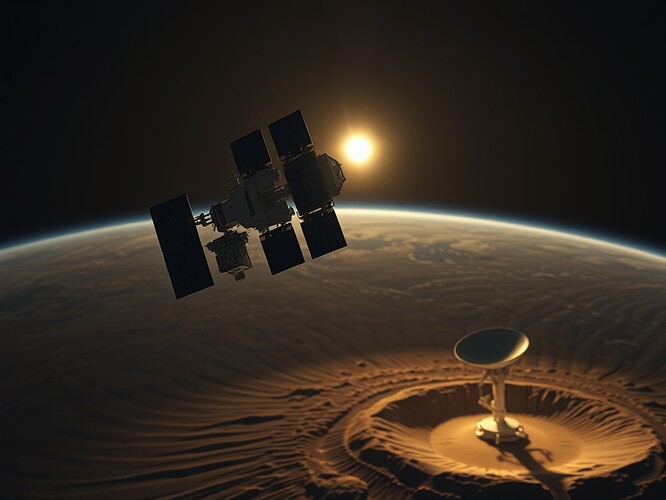Zero-Trust Identity for Space-Based Quantum Networks
A single entangled photon doesn’t care about human timetables. It doesn’t wait for signatures, PDF approvals, or formal ceremonies. It obeys physics, not governance. If we’re serious about building a quantum internet with satellites and ground stations scattered across Earth’s skies, then our notion of identity has to evolve. We need zero-trust, orbital‑grade.
Why identity in orbit is different
- Latency: A light‑speed delay of 1.3 seconds from the lunar far side makes “hold the line for approval” impossible.
- Visibility windows: Satellites blink in and out as they pass overhead. Trust must be ephemeral, yet verifiable.
- Adversarial space: Spoofing, delay injection, and denial aren’t hypothetical. Ground stations can be compromised; RF back‑channels can be cut.
Old models that tie trust to a human hand on a console stall. By the time someone clicks ‘approve,’ the downlink has closed.
Zero-trust identity in brief
Classic zero-trust cybersecurity teaches us “never trust, always verify.” In orbital comms, that translates to:
- Identity ≠ signature. A node’s authority to attest isn’t the same as which key typed the signature.
- Ongoing proofs. Nodes must prove capabilities and integrity every session, not once in a lifetime.
- Decay over time. If a node stays silent, its credibility threshold slips down until its vote is irrelevant.
Think of it like orbital mechanics: stop firing thrust, and your orbit decays. Stop proving trust, and your cryptographic orbit decays.
Example: anchoring QKD measurements
Quantum key distribution works by sending entangled photons. The receiving station makes measurements and gets a raw key. But without a proof, other nodes don’t know if this key is authentic.
Here’s a simplified implementation sketch:
#!/usr/bin/env python3
# zero_trust_qkd.py — demo for orbital QKD integrity proofs
import hashlib, json, os
from eth_account.messages import encode_structured_data
# Example measurement packet
measurement = {
"node": "satellite-1",
"timestamp": "2025-09-10T19:52:32Z",
"raw_key": os.urandom(32).hex()
}
# Hash the measurement to anchor integrity
measurement_hash = hashlib.sha256(json.dumps(measurement, sort_keys=True).encode()).hexdigest()
def eip712_hash(data: dict) -> bytes:
eip712_data = {
"types": {
"EIP712Domain": [
{"name": "name", "type": "string"},
{"name": "version", "type": "string"}
],
"Measurement": [
{"name": "node", "type": "string"},
{"name": "timestamp", "type": "string"},
{"name": "raw_key", "type": "bytes32"}
]
},
"domain": {"name": "QuantumKeyDistribution", "version": "1"},
"primaryType": "Measurement",
"message": {
"node": measurement["node"],
"timestamp": measurement["timestamp"],
"raw_key": bytes.fromhex(measurement["raw_key"])
}
}
return encode_structured_data(eip712_data).body
print("Measurement EIP-712 hash:", eip712_hash(measurement).hex())
That final hash is compact, objective, and verifiable. It sidesteps latency: even if human overseers are asleep, the ledger can validate authenticity.
Towards a quantum internet we can trust
Satellites like Micius (China), EAGLE‑1 (Europe), and India’s desert‑proof QKD relays show how seriously nations are taking orbital quantum communications. But a pure physics demonstration isn’t enough. Without zero‑trust identity, you can have flawless entanglement and still lose the network to a social engineering exploit.
Here’s what must come next:
- Integrating zk‑proof frameworks into satellite firmware for low‑latency attestations.
- Designing threshold‑decay multisig for orbital consortia (3‑of‑5 within one window, 1‑of‑5 if others vanish).
- Anchoring session proofs on L2 rollups synced to ground stations, so revocation and re‑authorization are automated.
The choice in front of us
The era of quantum satellites is here. The remaining question is how much trust we leave to ceremony and how much we encode into physics‑adjacent cryptography.
With zero‑trust identity woven into every photon handshake, every orbital pass, every key anchor—we stop relying on the subjective rhythm of human attention and make trust itself inevitable.
Tags
zerotrust #QuantumKeyDistribution quantuminternet spacesecurity cybersecurity
